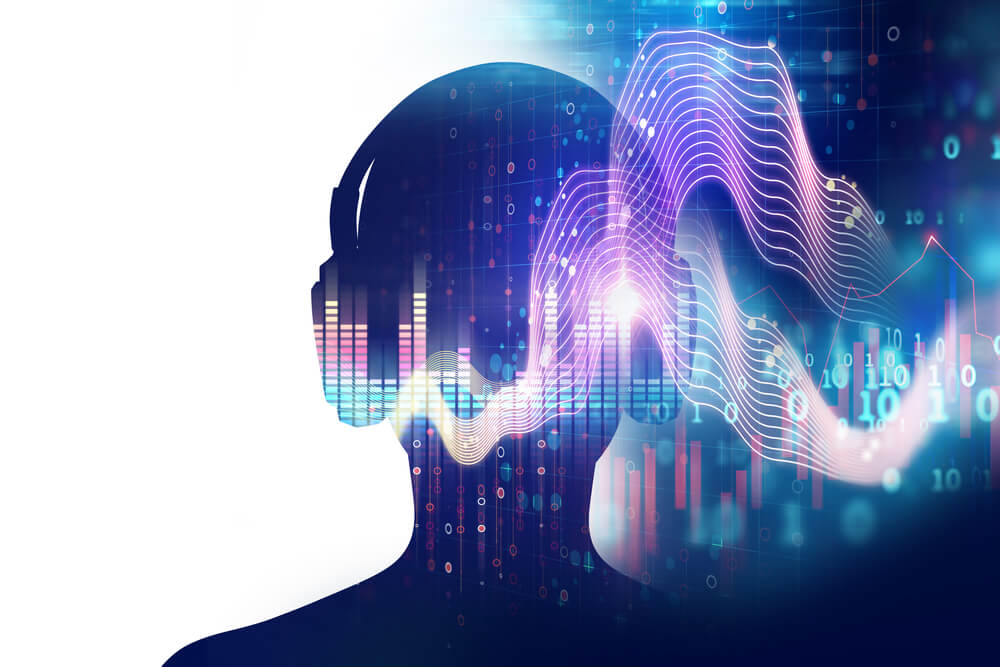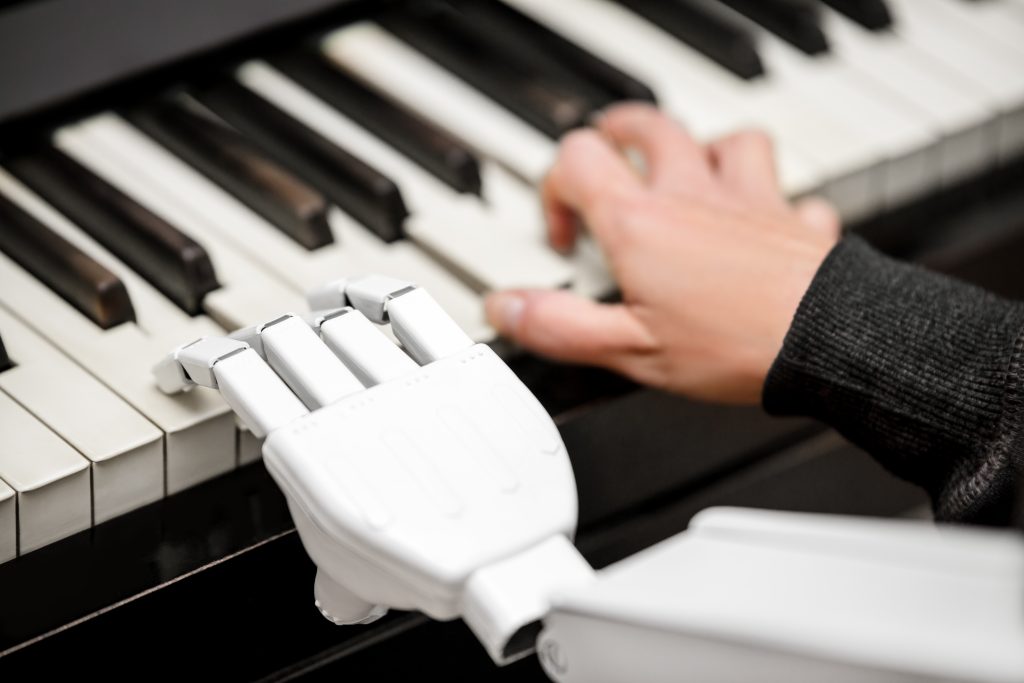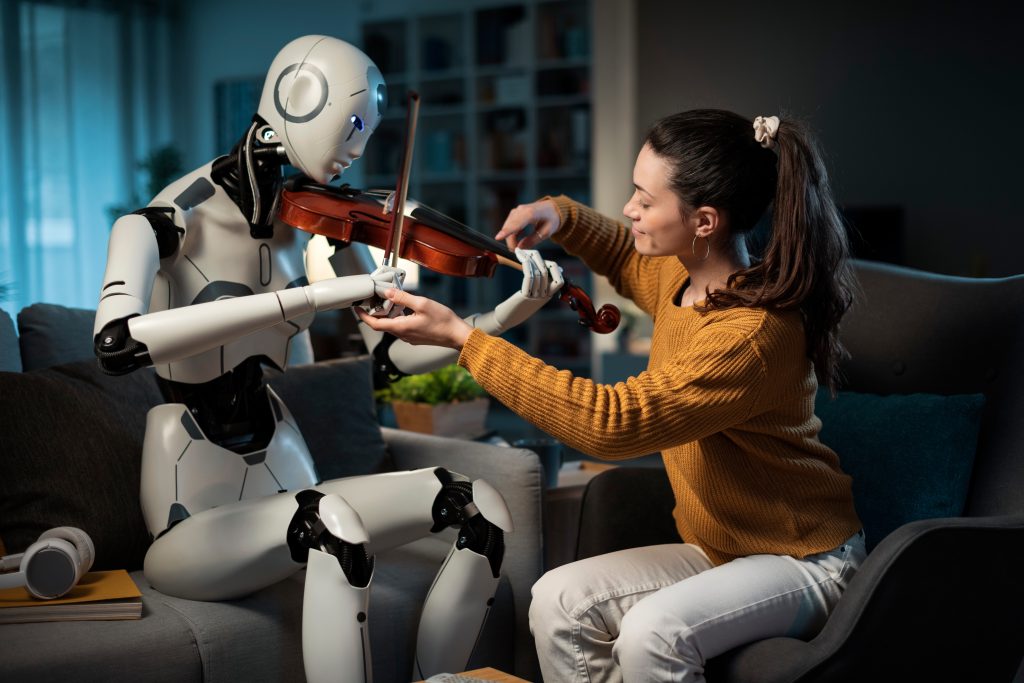Welcome to the innovative world of AI Music Composition, where artificial intelligence meets musical creativity to open new possibilities. In this article, we’ll look at how AI is changing the music industry and whether it can replace human composers. Whether you’re a musician, artist, or content creator, this guide aims to make AI music easy to understand and use for everyone.
AI Music Composition uses advanced technologies like machine learning and neural networks to analyze a lot of musical data. This helps AI analyze the intricate elements that make songs successful, including melodies, rhythms, and harmonies.
By applying this knowledge, AI Music Generator tools can assist in creating music that resonates deeply with listeners. Imagine making music that sounds professional, with AI helping you by suggesting improvements and refining your ideas.
As we explore how to use AI in music at Soundful, you’ll see how our platform makes creating music easy and fun. By the end of this guide, you’ll see how AI can be more than just a tool; it can be a powerful force that elevates your music to new heights. Let’s start this journey together, where your creativity and advanced AI open many musical possibilities.
Understanding AI Music Composition
A. The Basics of AI in Music
AI Music Composition refers to the use of artificial intelligence technologies to create or assist in creating music. These technologies include machine learning, neural networks, and other AI algorithms. Machine learning trains AI systems with many existing songs so they can learn musical patterns and styles. Neural networks, modeled after the human brain, help AI handle complex data and create music that feels real and emotionally engaging.
Soundful, for instance, uses these technologies to provide users with tools that enhance their music production capabilities. Using AI, musicians and composers can try new sounds and styles that would be too hard or take too long to do by hand. This opens music creation, making it accessible to people without formal musical training.

B. How AI Composes Music
AI Music Composition starts by giving the AI system lots of music from different genres and styles. This data includes melodies, harmonies, rhythms, and structures from numerous musical compositions. The AI analyzes this data to identify patterns and relationships between different musical elements.
Once the AI has learned from the data, it can generate new pieces of music. The process typically involves three main steps: data input, pattern recognition, and output generation.
During data input, the AI system receives a vast array of musical examples. In the pattern recognition phase, the AI identifies recurring motifs, chord progressions, and rhythmic structures. Finally, the AI uses what it learned to create new music that mixes familiar elements in creative ways.
Several AI music tools and platforms are available today. For example, Soundful offers an easy-to-use platform where users can work with AI to create and improve music tracks in real time. Other notable tools include Google’s Magenta, which is an open source project exploring the role of machine learning in the creative process, and Amper Music, which allows users to quickly create royalty free music for various purposes.
C. Differences Between AI and Human Composers
While AI has made significant strides in music composition, there are fundamental differences between AI and human composers. Human composers rely on creative intuition, emotional experiences, and cultural influences to craft their music. This human touch adds a depth and genuine feel that is often challenging for AI to fully replicate.
AI, on the other hand, processes music through algorithmic patterns and data analyzing. It lacks the personal experiences and emotional nuances that humans bring to their compositions. While AI can generate music that sounds impressive and complex, it may not always capture the same emotional depth and originality as a piece of music created by a human composer.
In conclusion, AI Music Composition represents a significant advancement in the music industry. It offers new tools and opportunities for musicians and content creators to explore, create, and innovate. However, the unique human elements of creativity and emotional expression remain essential. As we continue, we’ll look at the benefits and limits of AI in music, and see how AI and human composers can work together to expand musical creation.
Next, we will delve into the advantages AI brings to music composition and its impact on the music industry. Stay tuned to see how AI reshapes the way we produce, distribute, and consume music.

The Case for AI in Music
A. Benefits of AI Music Composition
AI Music Composition brings numerous benefits that are transforming the music industry. One of the primary advantages is efficiency.
AI can quickly analyze large amounts of data and create music much faster than a human composer. This speed is particularly beneficial for projects with tight deadlines, such as film scoring or commercial jingles. AI can quickly make high-quality tracks, letting musicians and producers focus more on creativity and less on technical details.
Another significant benefit of AI Music Composition is its capability to process vast amounts of musical data. By learning from a diverse range of music genres and styles, AI can draw inspiration from an extensive pool of existing songs. This ability to synthesize information allows AI to create unique musical compositions that might not be immediately intuitive to human composers. For instance, AI can combine elements of classical music with contemporary pop, resulting in innovative and fresh sounds.
B. AI’s Role in the Music Industry
AI Music Composition is also playing a crucial role in the broader music industry. It assists established artists and producers by automating routine tasks and providing creative suggestions. For example, AI can help with tasks such as chord progression, melody creation, and even mixing and mastering. This support lets artists try new ideas and push their creativity without being held back by technical problems.
Moreover, AI significantly impacts music production costs and availability. Traditional music production often requires expensive equipment and studio time, which can be prohibitive for many aspiring musicians. AI Music Composition tools are often cheaper and easier to use, so more people can create professional-quality music. This opening of music production means that talent is no longer limited by financial barriers.
C. Notable Achievements
AI Music Composition has already achieved several notable successes. For instance, various commercial applications use AI-generated music, from background music in advertisements to soundtracks in video games. These AI-composed tracks are often hard to tell apart from those created by human composers, showcasing the technology’s potential.
Collaborations between AI and famous musicians further highlight the benefits of AI Music Composition. Artists like Taryn Southern have used AI tools to help create whole albums, mixing human creativity with AI’s processing power.
These collaborations show that AI can be a helpful partner in the creative process, improving the work of human musicians instead of replacing them.
The Limitations of AI Music Composition
A. The Challenges of AI in Creative Processes
Despite its many benefits, AI Music Composition also faces significant challenges, particularly in the realm of creativity. One of the main criticisms is that AI lacks true creativity and originality. While AI can analyze and replicate musical patterns, it does not possess the emotional depth or personal experiences that often drive human creativity. This limitation means that AI-generated music can sometimes feel formulaic or lacking in genuine emotional impact.
Issues with copyright and originality also pose challenges for AI Music Composition. Since AI learns from existing songs, there is a risk of producing music that is too similar to the source material, leading to potential copyright infringements. Making sure AI-generated music is original and not just a copy of existing works is a difficult and ongoing issue.
B. Ethical Considerations
The rise of AI Music Composition also raises several ethical considerations. One major concern is authorship and creativity. Who should receive credit as the creator if an AI system generates a piece of music? This question becomes even more complicated when considering collaborations between AI and human artists.
Establishing clear guidelines for authorship and intellectual property rights in AI-generated music is essential to address these ethical dilemmas.
The economic impact of AI on human composers is another important consideration. As AI tools become more prevalent, there is a risk that human musicians may find it harder to compete in the industry. This shift could cause job losses for traditional composers, so it’s important to balance using AI’s abilities with keeping human contributions to music.
C. Public and Industry Perceptions
Public and industry perceptions of AI Music Composition are mixed. While some embrace the technology for its innovative potential, others are skeptical about its ability to replace human creativity. Surveys and studies show that while audiences may appreciate the novelty of AI-generated music, they still place a high value on the human touch and emotional depth that traditional compositions offer.
Critics argue that AI-generated music lacks the soul and genuine feel of human-made compositions. Many in the music industry echo this sentiment, believing that AI should enhance human creativity rather than replace it. Using AI in a way that adds to human talent and preserves the unique qualities of human-made music can be challenging.
Future Prospects
A. Technological Advancements
The future of AI Music Composition looks promising as technological advancements continue to push the boundaries of what AI can achieve. We expect innovations in machine learning and neural networks to enhance AI’s capabilities in music generation, allowing for more sophisticated and emotionally resonant compositions.
As AI technology improves, it will be able to study larger amounts of music and learn more detailed patterns and styles. This will enable AI to create music that is increasingly complex and nuanced, bridging the gap between machine-generated and human-composed music.
Additionally, integrating AI with other emerging technologies such as virtual reality (VR) and augmented reality (AR) will further transform the music industry. Imagine experiencing a piece of music not just audibly but also visually and interactively, with AI composing music in real-time based on your movements or surroundings. This convergence of AI with immersive technologies will create new, personalized listening experiences that are beyond the capabilities of traditional music production.
B. Human vs. Machine Collaboration
While AI Music Composition has great potential, the most exciting part is when AI and human composers work together. Rather than viewing AI as a replacement, many experts believe that the future of music lies in the synergy between human creativity and AI’s processing power. This collaboration can result in groundbreaking musical works that neither could achieve alone.
For instance, AI can handle the technical aspects of music production, such as generating complex harmonies or optimizing sound quality, allowing human composers to focus on the emotional and thematic elements of their music. This division of labor can lead to more polished and innovative musical compositions. Examples like the album “I AM AI” by Taryn Southern show how AI can boost human creativity, leading to unique and interesting music.
Furthermore, AI can serve as a valuable educational tool for aspiring musicians. By analyzing AI-generated music, musicians can gain insights into new styles and techniques, expanding their creative horizons. Platforms like Soundful provide a user-friendly interface for exploring these possibilities, making advanced music creation accessible to everyone, regardless of their technical background.

C. Can AI Fully Replace Human Composers?
The question of whether AI can fully replace human composers remains a topic of debate. AI Music Composition has shown it can create music that is both impressive and can sell well. AI’s proficiency in generating music based on learned patterns and data analysis allows it to produce compositions that are innovative and diverse. However, the essence of music—its emotional depth and personal touch—stems from human experience and creativity.
Experts say that while AI can help with creating music, it lacks the emotional connection that human composers bring to their work. Music isn’t just about being technically perfect; it’s about expressing human emotions, experiences, and culture. This human element is something that AI, no matter how advanced, cannot replicate entirely.
In conclusion, the future of AI Music Composition lies in its ability to work alongside human composers, rather than replacing them. By combining the strengths of AI and human creativity, we can explore new musical ideas and push the limits of what’s possible in music. The continued evolution of AI technologies will undoubtedly bring exciting changes to the music industry, offering new opportunities for innovation and collaboration.
As AI Music Composition evolves, it will become more important in the music industry, changing how we create, share, and enjoy music. Using this technology while keeping the unique qualities of human artistry will create a rich and diverse musical future for the next generations. Together, AI and human composers can create music that connects deeply, going beyond what either can do alone.
Conclusion
In summary, AI Music Composition is a big step forward for the music industry, giving artists and creators new tools and opportunities.
By using AI, musicians can explore new sounds, boost their creativity, and make high-quality tracks faster. AI’s ability to analyze vast musical datasets and generate songs quickly makes it a valuable asset in the music production process.
However, while AI Music Composition offers many benefits, it cannot fully match the emotional depth and originality of human composers. The real power of AI is in how it works with human creativity, creating a partnership that expands musical expression.
As AI technology grows, it will shape the future of music, offering new opportunities for both creators and listeners.
Embracing AI Music Composition means recognizing its strengths and integrating it thoughtfully into the creative process. By doing so, we ensure that we preserve and celebrate the unique qualities of human artistry. The future of music is not about choosing between AI and human composers but finding ways to bring out the best in both.
Soundful dedicates itself to helping you harness the power of AI Music Composition. We designed our platform to make advanced music creation easy and accessible, whether you are a seasoned musician or just starting out. Dive into the world of AI-driven music and discover how Soundful can transform your creative process.
Join us at Soundful and experience the future of music today. Embrace the possibilities of AI Music Composition, and let our tools help you create music that resonates deeply with audiences. Together, we can create a rich and diverse musical landscape that stands the test of time. Sign up now and start your journey with Soundful!

